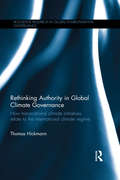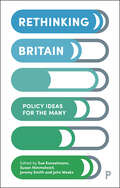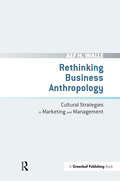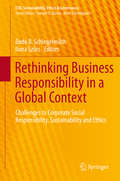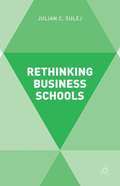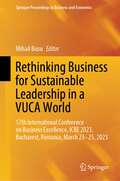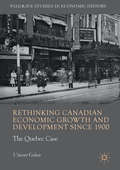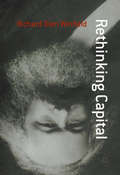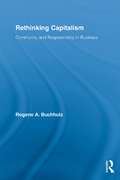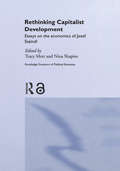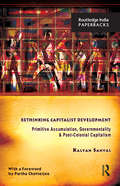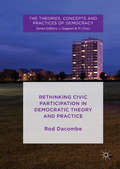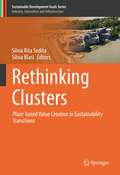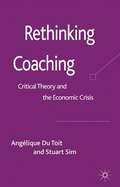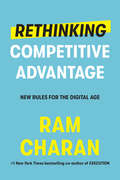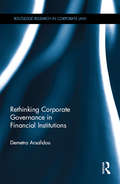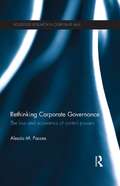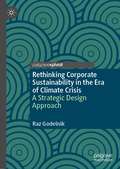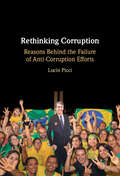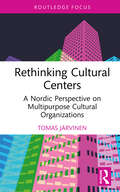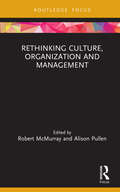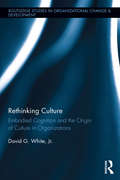- Table View
- List View
Rethinking Authority in Global Climate Governance: How transnational climate initiatives relate to the international climate regime (Routledge Research in Global Environmental Governance)
by Thomas HickmannIn the past few years, numerous authors have highlighted the emergence of transnational climate initiatives, such as city networks, private certification schemes, and business self-regulation in the policy domain of climate change. While these transnational governance arrangements can surely contribute to solving the problem of climate change, their development by different types of sub- and non-state actors does not imply a weakening of the intergovernmental level. On the contrary, many transnational climate initiatives use the international climate regime as a point of reference and have adopted various rules and procedures from international agreements. Rethinking Authority in Global Climate Governance puts forward this argument and expands upon it, using case studies which suggest that the effective operation of transnational climate initiatives strongly relies on the existence of an international regulatory framework created by nation-states. Thus, this book emphasizes the centrality of the intergovernmental process clustered around the United Nations Framework Convention on Climate Change (UNFCCC) and underscores that multilateral treaty-making continues to be more important than many scholars and policy-makers suppose. This book will be of great interest to students and scholars of global environmental politics, climate change and sustainable development.
Rethinking Britain: Policy Ideas for the Many
by Richard Murphy Kate Pickett Stewart Lansley Pauline Allen Johnna Montgomerie Francis Green Ian Gough Keith Ewing Jane Lethbridge Leslie Huckfield Howard Reed Beth Stratford Mary-Ann StephensonWhat if we had a government prepared to implement the policies that could radically change 21st-century Britain and improve people’s lives? Social and economic policies are rarely communicated clearly to the public, but it’s never been more important for citizens to understand and contribute to the debate around the country’s future. In everyday language, Rethinking Britain presents a range of ideas from some of the country’s most influential thinkers such as Kate Pickett and Ha-Joon Chang. From inflation to tax, and health to education, each contribution offers solutions which, if implemented, would lead to a fairer society. Curated by leading economists from the Progressive Economics Group and accompanied by a ‘jargon buster’, this book is an essential aid for citizens who are interested in critiquing inequalities while looking to build a better future.
Rethinking Business Anthropology: Cultural Strategies in Marketing and Management
by Alf H. WalleQualitative methods of business research are emerging as vital tools. Business anthropology is at the heart of this movement. Although many recent books provide nuts-and-bolts advice regarding the field, Rethinking Business Anthropology: Cultural Strategies in Marketing and Management discusses the intellectual traditions from which the discipline has emerged and how this heritage opens up new vistas for business research. Gaining these broader perspectives is essential as business anthropologists transcend being mere research technicians and seek to influence organizational policies and strategies. Opening chapters deal with the current status of the field and its relationship to ecological and cultural sustainability. This is followed by discussions of the intellectual foundations of anthropology and their continued importance to business anthropology. An array of chapters provides illustrative applications of business anthropology in order to demonstrate the field's unique and powerful potentials within both scholarly and practitioner research. The book concludes with a discussion of the role of business anthropologists in dealing with indigenous people, rural populations, and cultural enclaves. Increasingly, businesses seek to connect with such communities even though mainstream leaders and negotiators often lack the skills necessary to effectively do so. Business anthropologists, with their dual background in business and cultural diversity are poised to excel in this capacity. An appendix by Robert Tian, editor of the International Journal of Business Anthropology, provides a useful overview of the field as it now exists. As business anthropology comes of age, this timely monograph provides the perspectives needed for the growth and further development of the field and those who work within it. Excellent for the professional bookshelf and as a textbook.
Rethinking Business Responsibility in a Global Context: Challenges to Corporate Social Responsibility, Sustainability and Ethics (CSR, Sustainability, Ethics & Governance)
by Bodo B. Schlegelmilch Ilona SzőcsThis book examines topical issues in global corporate social responsibility (CSR) from both scholarly and practical perspectives. It offers a variety of viewpoints and cases from countries around the globe and combines them with current academic knowledge. Intended for students, academics, and managers wishing to keep abreast of the challenges and opportunities for corporations operating in our ever-more-complex globalized world, this book provides fresh insights into responsible business conduct.
Rethinking Business Schools
by Julian C. SulejHow do we create the business school and managers of the future? This challenging question has been addressed by a number of researchers in recent times from the perspective of 'what needs to be changed?' - few if any have provided much in the way of 'how do we change things to meet the challenges of the future?'. Rethinking Business Schools draws upon extensive case study evidence from both Russell Group and Non-Russell Group University Business Schools in the UK to answer some of these questions from a European perspective and stimulate a wider debate between university leaders, business leaders and potential students as to what the business school of the future should really look like and the performance outcomes it should provide as we move through the twenty-first century and beyond.
Rethinking Business for Sustainable Leadership in a VUCA World: 17th International Conference on Business Excellence, ICBE 2023, Bucharest, Romania, March 23-25, 2023 (Springer Proceedings in Business and Economics)
by Mihail BusuThis book presents a selection of the best papers from the 17th International Conference on Business Excellence, “Rethinking Business: Sustainable Leadership in a VUCA World” (ICBE 2023), held in Bucharest, Romania, in March 2023.In today's rapidly evolving landscape, characterized by volatility, uncertainty, complexity, and ambiguity (VUCA), the need to reshape business practices has become paramount. The book showcases research findings and perspectives on the new challenges particularly posed by the digital economy and research systems. Focusing on revolving business and developing sustainable leadership, it offers valuable insights into the present context of global crisis, together with solutions for the real-world challenges we face today.
Rethinking Canadian Economic Growth and Development since 1900
by Vincent GelosoThis book argues against popular historic narratives that Quebec's economic development only started catching up to the rest of Canada after 1960, a year that marked the beginning of the Quiet Revolution. Geloso argues that there are three reasons to rethink the growth of Quebec in Canada. Firstly, from the early days of the Canadian federation until the Second World War, Quebec did grow poorer relative to the other provinces. Secondly, from 1945 to 1960, there was a rapid era of growth that allowed the province to catch at a rapid pace. During that period, the seeds of future growth - notably through a pronounced surge in educational attainment - were sowed. Thirdly, the era from 1960 to 1976 exhibited no break from the trend set from 1945 to 1960. In fact, after 1976, Quebec's convergence slowed to a halt and its gap with the rest of Canada has remained more or less constant since. At each point, Geloso elaborates on the role of institutions, policies and culture played in altering the trend of convergence. A revised and updated English translation of Du Grand Rattrapage au D#65533;clin Tranquille, Geloso brings the Quebec case into contemporary debate around the impact of interventionist economic policies.
Rethinking Capital
by Richard Dien WinfieldThis book develops a comprehensive systematic economic theory, conceiving how the dynamic of market relations generates an economy dominated by the competitive process of individual profit-seeking enterprises. The author shows how, contrary to classical political economy and contemporary economics, the theory of capital is an a priori normative account properly belonging to ethics. Exposing and overcoming the limits of the economic conceptions of Hegel and Marx, Rethinking Capital determines how the system of capitals shapes economic freedom, jeopardizing the very rights in whose exercise it consists. Winfield thereby provides the understanding required to guide the private and public interventions with which capitalism can be given a human face.
Rethinking Capital
by Richard Dien WinfieldThis book develops a comprehensive systematic economic theory, conceiving how the dynamic of market relations generates an economy dominated by the competitive process of individual profit-seeking enterprises. The author shows how, contrary to classical political economy and contemporary economics, the theory of capital is an a priori normative account properly belonging to ethics. Exposing and overcoming the limits of the economic conceptions of Hegel and Marx, Rethinking Capital determines how the system of capitals shapes economic freedom, jeopardizing the very rights in whose exercise it consists. Winfield thereby provides the understanding required to guide the private and public interventions with which capitalism can be given a human face.
Rethinking Capitalism: Community and Responsibility in Business (Routledge Studies in Business Ethics)
by Rogene BuchholzGiven the recent financial meltdown and continuing economic problems the country and the world are facing, Rethinking Capitalism is particularly relevant. With the government having bailed out banks and other financial institutions as well as automobile companies, and anger over the compensation and severance packages provided to the managers of failed institutions in light of growing inequalities and continued high unemployment in American society, many are wondering if self-interest driven free-market capitalism is still viable. While there is some support for more active government regulation of financial and other institutions, there is also significant opposition to such an approach as new political movements gain strength. Are there other alternatives to create a more responsible capitalism that serves the entire society? Rethinking Capitalism questions the individualistic assumptions of a capitalist society and offers a new way to understand capitalism that entails a new role for business based on community and responsibility. Using classical American Pragmatism as a philosophical framework for capitalism, Professor Buchholz analyzes the history of capitalistic thought and proposes that we recast management as a profession akin to law and medicine oriented toward serving the public rather than just maximization of shareholder wealth. Buchholz challenges the way we understand capitalism with its emphasis on the creation of economic wealth and growth to the exclusion of other important goals and champions a new approach to the creation of a more sustainable and responsible functioning of the capitalistic system, the corporate organization, and its management.
Rethinking Capitalist Development: Essays on the Economics of Josef Steindl (Routledge Frontiers of Political Economy #Vol. 50)
by Nina Shapiro Tracy MottThis collection honours the work of the eminent economist Josef Steindl. Steindl's work is illuminated through a critical appraisal of its central constructs with a focus on its relevance to current economic conditions. This collection charts the thinking of one of the leading economic theorists of the twentieth century.
Rethinking Capitalist Development: Primitive Accumulation, Governmentality and Post-Colonial Capitalism
by Kalyan SanyalIn this book, Kalyan Sanyal reviews the traditional notion of capitalism and propounds an original theory of capitalist development in the post-colonial context. In order to substantiate his theory, concepts such as primitive accumulation, governmentality and post-colonial capitalist formation are discussed in detail. Analyzing critical questions from a third world perspective such as: Will the integration into the global capitalist network bring to the third world new economic opportunities? Will this capitalist network make the third world countries an easy prey for predatory multinational corporations? The end result is a discourse, drawing on Marx and Foucault, which envisages the post-colonial capitalist formation, albeit in an entirely different light, in the era of globalization.
Rethinking Career Studies
by Wolfgang Mayrhofer Hugh GunzCareers are studied across many disciplines - particularly from the social sciences - but there is little conversation between them. Many scholars are studying the same thing in different ways, too often missing opportunities to learn from one another and draw on each other's ideas and findings to enrich their own. Gunz and Mayrhofer bridge these scholarly discourses as they explore the meaning of 'career' and answer the question: What is it that career scholars do when they study careers? The framework that emerges from this answer - the Social Chronology Framework (SCF) - vitally facilitates valuable conversations between scholars in different intellectual traditions. Building on the SCF framework, this comprehensive introduction to career studies encourages students, researchers and practitioners to identify commonalities between the topics they are studying and those examined in other fields, such as organization studies, drawing together interdisciplinary insights into career outcomes and their influencing factors.
Rethinking Cities: Chicago on the Move
by Rosabeth Moss Kanter Ai-Ling Jamila MaloneIt is impossible to discuss national competitiveness without considering cities and the regions they anchor. Cities are transportation hubs, centers of commercial exchange, and the locus of lives. They thrive by the ways they connect to the world. Demographic changes in recent years-such as the decreasing popularity of cars and increasing urban populations-have implications for 21st century transportation and infrastructure. This is apparent in the case of Chicago, a global city in the vanguard of change. This paper focuses on five major 21st century transportation and infrastructure projects in Chicago: rail decongestion; airport modernization; mass transit modernization; a complete streets plan; and an infrastructure trust as a financing innovation. It also discusses leadership by Mayor Rahm Emanuel to create an integrated strategy that includes technology and education, and how he executes on it.
Rethinking Civic Participation in Democratic Theory and Practice (The Theories, Concepts and Practices of Democracy)
by Rod DacombeThis book makes an important contribution to contemporary debates over the place of civic participation in democratic theory and practice. Drawing on a detailed case study of the Blackbird Leys area of Oxford, the book employs a novel empirical approach to ask whether widespread participation in civic life can enhance the prospects for democracy, given the low levels of participation which tend to exist in deprived areas. Throughout, it presents an account of participation rooted in the history and development of the case, in order to avoid the kinds of abstraction which are characteristic of many existing studies in the area. The book will appeal to scholars working on democratic theory in applied settings, and will be of interest to anyone concerned with inequalities in civic participation.
Rethinking Clusters: Place-based Value Creation in Sustainability Transitions (Sustainable Development Goals Series)
by Silvia Rita Sedita Silvia BlasiThis volume discusses how different geographical spaces can enhance or hinder the capacity of a variety of organizational settings to achieve economic value creation in the pursuit of sustainable regional development. In order to provide the most comprehensive picture of new sources of value creation for sustainable transitions, the book collects contributions that tackle this issue from a variety of perspectives, and adopts a systemic approach where macro, meso and micro-levels of analysis are intertwined in three sections. This multidisciplinary and interdisciplinary approach comes from scholars operating in the fields of planning, economic geography, social entrepreneurship and organizational management. The first section of the book adopts a macro-level approach linking sustainability to the regional development theme, and addresses how organizations work between different social interests to produce outcomes not previously realized. The second section of the book focuses on the spatial dimensions of sustainable development, with particular clusters, industrial districts and regions considered as relevant units of analysis (meso-level analysis). The third section of the book is dedicated to a micro-level approach, illustrating how to drive social entrepreneurship activities, which are based upon sustainable business models centered in the creation of a shared value. The book is geared towards scholars working on sustainable development issues intersecting the disciplines of regional studies, economic geography and management, and will appeal to geographers and researchers in economic development, business innovation, and sustainability transitions.
Rethinking Coaching
by Ang�lique Du Toit Stuart SimCoaching is being proposed as the best method to encourage a change in the ideologies that have brought about the credit crunch. The authors' concern is to show how coaching can widen its intellectual range to become a progressively more effective technique within organizational life.
Rethinking Competitive Advantage: New Rules for the Digital Age
by Ram CharanHow do you gain an edge in the digital world order? &“Another book for the ages from a master! . . . Particularly insightful is his emphasis on how the end-to-end individual consumer experience will separate winners from losers in our new digital age.&”—Fred Hassan, chairman, Caret Group; former CEO, Schering-Plough and PharmaciaThe old ways of creating competitive advantage for your business—such as building moats to ward off competitors—have become dangerous. Giants like Amazon and Alibaba are creating vast new market spaces through a deft combination of tools like machine learning and business savvy that reimagines customer experiences while generating immense shareholder value. A handful of traditional companies, including Fidelity Investments, Walmart, and B2W, have adopted these new approaches to reinvigorate their businesses. Most, however, are stalled—and the clock is running out. In this lively, accessible guide, Ram Charan, bestselling author and adviser to some of the world&’s top CEOs and boards, redefines competitive advantage for the digital-first era, offering a set of new rules to get ahead:• Create an ecosystem with third-party partners to revolutionize and personalize the customer experience.• Empower teams focused on a single task, building a &“social engine&” that drives constant innovation, fast execution, and customer satisfaction.• Attract funders who understand the big picture: that beyond a certain scale, major upfront spending will turn into a cash-generation machine. Filled with stories that peek behind the curtain of digital behemoths as well as traditional companies that have transformed their organizations, Rethinking Competitive Advantage offers concrete advice and methods to help you conceive of new market spaces and moneymaking models. Competing against digital giants might seem daunting, if not impossible. The necessary computing power is within any company&’s reach. By borrowing from these digital winners&’ playbooks, traditional companies and upstarts alike can gain an upper hand. Whether you&’re in the C-suite or brainstorming the next big idea from your garage, Rethinking Competitive Advantage is the ultimate guide to creating competitive advantage today.
Rethinking Corporate Governance in Financial Institutions (Routledge Research in Corporate Law)
by Demetra ArsalidouThere are many deep-seated reasons for the current financial turmoil but a key factor has undoubtedly been the serious failings within the corporate governance practices of financial institutions. There have been shortcomings in the risk management and incentive structures; the boards’ supervision was at times weak; disclosure and accounting standards were in some cases inadequate; the institutional investors’ engagement with management was at times insufficient and, last but not least, the remuneration policies of many large institutions appeared inappropriate. This book will provide a critical overview and analysis of key corporate governance weaknesses, focusing primarily on three main areas: directors’ failure to understand complex company transactions; the poor remuneration practices of financial institutions; and, finally, the failure of institutional investors to sufficiently engage with management. The book, while largely focused on the UK, will also consider EU and Australian developments as well as offering a comparative angle looking at the corporate governance of financial institutions in the US.
Rethinking Corporate Governance: The Law and Economics of Control Powers (Routledge Research in Corporate Law)
by Alessio PaccesThe standard approach to the legal foundations of corporate governance is based on the view that corporate law promotes separation of ownership and control by protecting non-controlling shareholders from expropriation. This book takes a broader perspective by showing that investor protection is a necessary, but not sufficient, legal condition for the efficient separation of ownership and control. Supporting the control powers of managers or controlling shareholders is as important as protecting investors from the abuse of these powers. Rethinking Corporate Governance reappraises the existing framework for the economic analysis of corporate law based on three categories of private benefits of control. Some of these benefits are not necessarily bad for corporate governance. The areas of law mainly affecting private benefits of control – including the distribution of corporate powers, self-dealing, and takeover regulation – are analyzed in five jurisdictions, namely the US, the UK, Italy, Sweden, and the Netherlands. Not only does this approach to corporate law explain separation of ownership and control better than just investor protection; it also suggests that the law can improve the efficiency of corporate governance by allowing non-controlling shareholders to be less powerful.
Rethinking Corporate Sustainability in the Era of Climate Crisis: A Strategic Design Approach
by Raz GodelnikThis book provides a clear, critical, and timely analysis of the state of corporate sustainability within the context of the climate crisis. It offers not only a substantive critique of the current efforts but also clarity about the changes needed and how to implement them. The book goes beyond the more common debate on shareholder capitalism vs. stakeholder capitalism to explain the shortcomings of the current approach to sustainability in business, which the author describes as sustainability-as-usual. Using strategic design lenses, the author proposes a new model of awakened sustainability, which offers a transformational shift in corporate sustainability to ensure companies fairly and effectively address the climate crisis. The book presents the numerous changes needed in the environment in which companies operate to enable awakened sustainability and how these changes can be realized. Grounded in the scientific community’s calls for urgent action on climate change, this groundbreaking text provides scholars with an evaluation of current and future trends in corporate sustainability. It connects the dots between the progress made in the last five decades and the opportunities entailed in the work on a regenerative and just vision for companies in this decade and beyond.
Rethinking Corruption: Reasons Behind the Failure of Anti-Corruption Efforts
by Lucio PicciWhy have anti-corruption efforts often failed? Current thinking on corruption has largely overlooked the profound implications of its contested nature, which paradoxically makes it an effective yet highly dysfunctional 'tool of government.' As a tool of government, it helps execute policies and guarantees a degree of political order. Moreover, anti-corruption measures are wielded as political instruments, strategically embraced by governments and oppositions to further their respective agendas. Based on an analysis of Russia, Brazil and the United States, Rethinking Corruption takes a fresh look at corruption and critiques the prevailing view of anti-corruption policies. Embarking on a captivating journey through these countries, this book encompasses the notion of legal corruption and invites a comprehensive reconsideration of corruption, with a focal point on questions of economic and political equality.
Rethinking Cultural Centers: A Nordic Perspective on Multipurpose Cultural Organizations (Routledge Focus on the Global Creative Economy)
by Tomas JärvinenWhat are cultural centers for? This book offers a unique and dynamic guide to managing these organizations, and the challenge of reconciling cultural aims with business success. Drawing on research and practice, it provides case- based insights into common managerial problems and their solutions. Although international research demonstrates that culture has positive economic impact and many cultural institutions are multimillion dollar institutions, there has been little research on how cultural centers are managed to combine cultural and economic impact. Due to the diversity of their missions and purpose, cultural centers in Europe often struggle to find business success. By drawing on recent cases from Finland and Sweden, and focusing on the challenges that face both managers and organizations, this book explores the incentives that underpin the foundation of cultural centers, and what is needed to make them a success. By defining the complex challenges that face cultural centers, this book enables managers to move beyond administrating an organization to becoming cultural entrepreneurs, turning good ideas into good business. In this underresearched area, this book will be essential reading for researchers, policy makers and managers working in cultural centers and museum management.
Rethinking Culture, Organization and Management (Routledge Focus on Women Writers in Organization Studies)
by Alison Pullen Robert McMurrayThe purpose of this book is to reimagine the concept of culture, both as an analytical category and disciplinary practice of dominance, marginalization and exclusion. For decades culture has been perceived as a ‘hot topic’. It has been written about and deployed as part of ‘a search for excellence’; as a tool through which to categorise, rank, motivate and mould individuals; as a part of an attempt to align individual and corporate goals; as a driver of organizational change, and; as a servant of profit maximisation. The women writers presented in this book offer a different take on culture: they offer useful disruptions to mainstream conceptions of culture. Joanne Martin and Mary Douglas provide multi-dimensional holistic accounts of social relations that point up similarity and difference. Rather than offering totalising or prescriptive models, each author considers the complex, polyphonic and processual nature of culture(s) while challenging us to acknowledge and work with ambiguity, fluidity and disruption. In this spirit writings of Judi Marshall, Arlie Hochschild, Kathy Ferguson, Luce Irigaray and Donna Haraway are employed to disrupt extant management cultures that lionise the masculine and marginalise the concerns, perspectives and contributions of women and the diversity of women. These writers bring bodies, emotions, difference, resistance and politics back to the centre stage of organizational theory and practice. They open us up to the possibility of cultures suffused with multifarious potentiality rather than homogeneity and faux certainty. As such, they offer new ways of understanding and performing culture in management and organization. This book will be relevant to students and researchers across business and management, organizational studies, critical management studies, gender studies and sociology.
Rethinking Culture: Embodied Cognition and the Origin of Culture in Organizations (Routledge Studies in Organizational Change & Development)
by David G. WhiteOrganizational or corporate ‘culture’ is the most overused and least understood word in business, if not society. While the topic has been an object of keen academic interest for nearly half a century, theorists and practitioners still struggle with the most basic questions: What is organizational culture? Can it be measured? Is it a dependent or independent variable? Is it causal in organizational performance, and, if so, how? Paradoxically, managers and practitioners ascribe cultural explanations for much of what constitutes organizational behavior in organizations, and, moreover, believe culture can be engineered to their own designs for positive business outcomes. What explains this divide between research and practice? While much academic research on culture is challenged by ontological, epistemic and ethical difficulties, there is little empirical evidence to show culture can be deliberately shaped beyond espoused values. The gap between research and practice can be explained by one simple reason: the science and practice of culture has yet to catch up to managerial intuition.Managers are correct in suspecting culture is a powerful normative force, but, until now, current theory and research is not able to adequately account for cultural behavior in organizations. Rethinking Culture describes and presents evidence for a new framework of organizational culture based on the cognitive science of the so-called cultural mind. It will be of relevance to academics and researchers with an interest in business and management, organizational culture, and organizational change, as well as cognitive and cultural anthropologists and sociologists interested in applications of theory in organizational and institutional settings.
